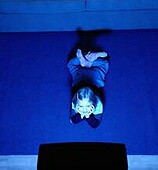Restricting TV and Computer Time Helps Kids Lose Weight
Finding offers hope for curbing pediatric obesity epidemic in U.S.
By Steven Reinberg
HealthDay Reporter
|
E-mail this article
Subscribe to news
Printer friendly version
|

(SOURCES: David Katz, M.D., M.P.H., director, Yale Prevention Research Center, Yale University School of Medicine, New Haven, Conn.; March 2008, Archives of Pediatrics & Adolescent Medicine)
MONDAY, March 3 (HealthDay News) -- Cutting kids' TV and computer time by half reduced the amount of food they ate and helped them lose weight, a new study found.
The finding offers hope to the problem of childhood obesity in the United States, where an estimated 16 percent of children ages 6 to 19 years old are overweight, a 45 percent increase in one decade, according to federal researchers.
"Television viewing is related to consumption of fast food and foods and beverages that are advertised on television," the study authors said in a prepared statement. "Viewing cartoons with embedded food commercials can increase choice of the advertised item in preschoolers, and television commercials may prompt eating."
The findings are published in the March issue of the Archives of Pediatrics & Adolescent Medicine.
For the study, Leonard H. Epstein, a professor in the department of pediatrics and social and preventive medicine at the University at Buffalo, the State University of New York, and his colleagues studied 70 overweight children, aged 4 to 7, who watched TV or played computer games for at least 14 hours a week.
The researchers installed a monitoring device on each television and computer the child used; the device allowed for the reduction of the children's weekly screen time by 10 percent a week until a 50 percent reduction had been reached. Each family member was given a unique code to activate the TV or computer. In addition, the kids received such incentives as money and stickers to spend less time with TVs or computers.
The other overweight children had no restriction on their use of TVs or computers.
Epstein's team found that the children who had no restrictions on their computer or TV use reduced their TV watching or computer-games playing by 5.2 hours a week. But the kids with restricted use cut their TV and computer time by 17.5 hours a week.
And, the children with restricted TV and computer time lost more weight than the other children. However, the researchers found no difference between the two groups in terms of physical activity.
"Using technology to modify television viewing eliminates parental vigilance needed to enforce family rules and reduces the disciplinary action needed if a child exceeds his or her sedentary behavior limits," the authors concluded. "Perhaps most important, the device puts the choice of when to watch television in the child's control, as opposed to a rule such as 'no television time until homework is completed.'"
Dr. David Katz, director of the Yale University School of Medicine Prevention Research Center, said the study, "shows the upside to this ominous mix -- reducing screen time can help prevent childhood obesity by several mechanisms. Less screen time may be even more important to dietary pattern than to physical activity pattern. But by either means, the ends here are encouraging and highlight the importance of this strategy."
More information
For more on childhood obesity, visit the American Academy of Pediatrics. 
Copyright © 2008 ScoutNews, LLC. All rights reserved. 
HealthDayNews articles are derived from various sources and do not reflect federal policy. healthfinder.gov does not endorse opinions, products, or services that may appear in news stories. For more information on health topics in the news, visit the healthfinder.gov health library.